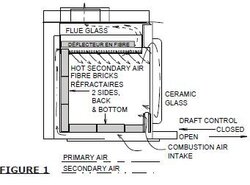To save money on heating oil costs ($3.49 gallon yesterday - yikes) I looked into getting an insert to make efficient use of my fireplace to help heat my approx 1,500 sq foot Cape. I wanted backup heat source if power went out, and ability to warm food if I lost power. Wood stove insert sounded good but as a single female with one daughter in college and my son going to college in the fall, I didn't want to worry about wood myself. . . until I heard about BioBricks/Liberty Bricks, etc. while I was on my travels to different dealers trying get educated and decide which insert to buy. The bricks seemed to solve my only remaining concern with having a wood stove insert and making it more convenient for me. Most of the dealers I spoke to, not only suggested the bricks to solve my concern, but actually sold the bricks too. I could pick it up, store it in the basement and be good to go. Aside from a problem trying to get the installation to pass inspection (that's another story), I sent an email through Napolean's website to ask the proper way to load the insert when using bricks since I wasn't getting the amount of time that I was hearing I should, specifically overnight. Imagine my surprise when the email came back saying that bricks weren't approved for use in their stoves! Are you kidding me? About 5 different stove places and $3,500 later, now I find out I'm not supposed to use the bricks?? The bricks that many of their authorized Napoleon dealers sold and discussed with me using to solve my final dilemma in owning a insert? What's the deal on this? I can tell from the posts that I've seen my brief time checking out this site that there are a lot of very knowledgeable people here. I'm still learning the lingo (e.g., secondary burn, etc.) and how to use the stove but now I'm afraid to use the bricks - what's the real deal here? Help?
Napoleon insert 1402
Napoleon insert 1402


 ). I've been burning off and on in stoves and fireplaces since I was a kid, but what I know about EPA stoves I've learned from this site and by some trial and error with my PE Vista over the last 3 years. My own opinion, and it's only that, is that if it will not void your stove's warranty, quality wood bricks can be used safely in an EPA stove with careful burning practices. Now, excuse me, I've got to put some more bricks on the fire.
). I've been burning off and on in stoves and fireplaces since I was a kid, but what I know about EPA stoves I've learned from this site and by some trial and error with my PE Vista over the last 3 years. My own opinion, and it's only that, is that if it will not void your stove's warranty, quality wood bricks can be used safely in an EPA stove with careful burning practices. Now, excuse me, I've got to put some more bricks on the fire.